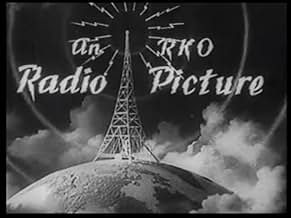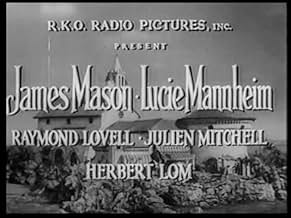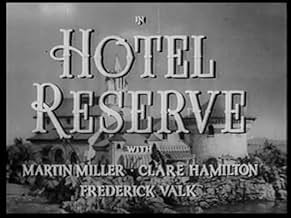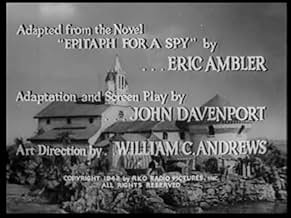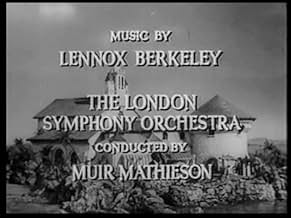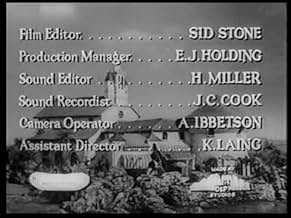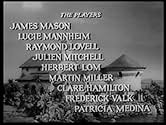PUNTUACIÓN EN IMDb
6,2/10
960
TU PUNTUACIÓN
Añade un argumento en tu idiomaA hunt for a spy, in an hotel in the South of France just before World War Two.A hunt for a spy, in an hotel in the South of France just before World War Two.A hunt for a spy, in an hotel in the South of France just before World War Two.
- Dirección
- Guión
- Reparto principal
Joseph Almas
- Albert, the waiter
- (as Josef Almas)
Hella Kürty
- Hilda Vogel
- (as Hella Kurty)
Reseñas destacadas
Propaganda plays a key role in modern warfare, so between 1939 and 1945 the British cinema made an important contribution towards our war effort. Although "Hotel Reserve" is set during the pre-war period, it can nevertheless be regarded as a propaganda film as it is a spy thriller in which the Nazis are the villains and the good guys, apart from the French intelligence services, are Austrian and German anti-Nazi émigrés.
In the summer of 1938 Peter Vadassy, a young Austrian medical student studying in France, is on holiday at the Hotel Reserve in the south of France. Being a keen photographer, he takes a number of photographs and then takes the negatives to the local pharmacy to have them developed. When he tries to collect the prints, however, he is arrested by French intelligence. It turns out that some of the photographs are of the French naval base at Toulon. Michel Beguin, the intelligence officer who interrogates Peter, realises that he is not a spy, but nevertheless sends him back to the hotel with instructions to find the real culprit, under threat of expulsion from France. This would mean Peter's having to abandon his medical studies and, as he is opposed to the Nazi regime, has no desire to return to Austria. (Contrary to what is argued in the "goofs" section, the year must be 1938, not 1937).
As others have pointed out, the plot of "Hotel Reserve"- an innocent man caught up in international espionage- could be that of an Alfred Hitchcock film. It was one he used in, among others, the two versions of "The Man who Knew Too Much" and "North by North-West". (James Mason, who appears as Peter here, also appeared in "North by North-West", his only collaboration with Hitchcock, although in that case as the film's villain rather than its hero). By 1944, however, Hitch had left Britain for Hollywood, so was not available. The film was both directed and produced by a trio: Lance Comfort, Mutz Greenbaum (aka Max Greene) and Victor Hanbury.
It is interesting to speculate what the film might have looked like had Hitchcock directed it. There would probably have been a more prominent leading role for Peter's love-interest Mary, who would doubtless have been played by a blonde. Hitch would also probably have maintained a greater level of suspense throughout; in the film as it exists the tension tends to slacken in the middle, although there is a very tense (and very Hitchcockian) final scene involving a rooftop cliff-hanger. This is a decent, but not outstanding, spy thriller, and mason made many better films in his long and distinguished career, but in 1944 it was doubtless appreciated. 6/10.
In the summer of 1938 Peter Vadassy, a young Austrian medical student studying in France, is on holiday at the Hotel Reserve in the south of France. Being a keen photographer, he takes a number of photographs and then takes the negatives to the local pharmacy to have them developed. When he tries to collect the prints, however, he is arrested by French intelligence. It turns out that some of the photographs are of the French naval base at Toulon. Michel Beguin, the intelligence officer who interrogates Peter, realises that he is not a spy, but nevertheless sends him back to the hotel with instructions to find the real culprit, under threat of expulsion from France. This would mean Peter's having to abandon his medical studies and, as he is opposed to the Nazi regime, has no desire to return to Austria. (Contrary to what is argued in the "goofs" section, the year must be 1938, not 1937).
As others have pointed out, the plot of "Hotel Reserve"- an innocent man caught up in international espionage- could be that of an Alfred Hitchcock film. It was one he used in, among others, the two versions of "The Man who Knew Too Much" and "North by North-West". (James Mason, who appears as Peter here, also appeared in "North by North-West", his only collaboration with Hitchcock, although in that case as the film's villain rather than its hero). By 1944, however, Hitch had left Britain for Hollywood, so was not available. The film was both directed and produced by a trio: Lance Comfort, Mutz Greenbaum (aka Max Greene) and Victor Hanbury.
It is interesting to speculate what the film might have looked like had Hitchcock directed it. There would probably have been a more prominent leading role for Peter's love-interest Mary, who would doubtless have been played by a blonde. Hitch would also probably have maintained a greater level of suspense throughout; in the film as it exists the tension tends to slacken in the middle, although there is a very tense (and very Hitchcockian) final scene involving a rooftop cliff-hanger. This is a decent, but not outstanding, spy thriller, and mason made many better films in his long and distinguished career, but in 1944 it was doubtless appreciated. 6/10.
A young James Mason does a fine job in this film. The story is set a few years before the start of WW II. Mason is a guest at a quiet resort hotel in France. His camera is accidentally used by a German spy who has an identical one. When Mason takes a roll of film to be developed, the roll contains several pictures of top secret French aircraft and facilities. The police question Mason and are able to determine that he is innocent in the matter. But, they use the charges against him as leverage to get him to assist them in finding out which of the other hotel guests is the spy. How he succeeds makes for a most interesting and tension filled story.
James Mason, refugee from what was formerly Austria is now at a resort hotel
on the French Riviera when he's picked up as a spy. Of course he's not our
spy, however he's let go by the authorities and put under essentially house
arrest at the hotel. Someone switched cameras there on him and he'd like to
find out who is a real spy at the hotel.
He's got quite a few choices. Some he'd like not to think of as a spy others look like they could have come from central casting as sneaky and spy like. As a detective he's not very good and it is fortunate the authorities do have the situation closely monitored.
The object of all this is the French naval base at Toulon. It's been the home of their Mediterranean fleet since the middle ages. Still is.
The film is based on a novel by Eric Ambler and Mason himself didn't feel it was something that belonged in his best work. Still he's not bad as the Eric Ambler protagonist in this film.
He's got quite a few choices. Some he'd like not to think of as a spy others look like they could have come from central casting as sneaky and spy like. As a detective he's not very good and it is fortunate the authorities do have the situation closely monitored.
The object of all this is the French naval base at Toulon. It's been the home of their Mediterranean fleet since the middle ages. Still is.
The film is based on a novel by Eric Ambler and Mason himself didn't feel it was something that belonged in his best work. Still he's not bad as the Eric Ambler protagonist in this film.
One wonders what this movie would have become if Hitchcock had gotten his hands on it. Would he have revved up the plot, tightened up the script, recast some of the characters, put in a highway chase over the countryside interrupted by sheep, added a more appealing female interest for Mason? The climb up to the roof at the end, the strong lighting and direct closeups, the art and photographic direction(seemingly uncredited to one of the directors),as well as the music score and the general "look" of the film, not to mention James Mason's compelling presence all had the ingredients for a potential Hitchcockian thriller, but something is missing here. The plot's not that complicated (certainly not like "The Lady Vanishes") and there seems not to be enough risk or sense of danger (certainly not like "The 39 Steps")to Mason's life, although there is suspense and surprise along the way. One big weakness is the supporting cast. The young lady's character (can't even remember her name) isn't developed enough, nor does she have sufficient charm or sex appeal, as a Hitchcockian heroine would.
Still one watches it for Mason, before he has developed any overt mannerisms or been sadly type-cast as a villain. He seems to have made a number of these not-quite-up-to-snuff pictures in his career. Was he hard up? why didn't Hitchcock cast him and why didn't he ever accept a Powell & Pressburger offer? His presence on any number of these "grade-b" films, including the brief appearance in "Madame Bovary" (with Jenifer Jones), for example, or in the disappointing "Mayerling," adds a sense of gravitas to any of the proceedings in which he appeared, but the scripts and directors fail him, if not the cast.
Fortunately, he can be remembered for his appearance as Captain Nemo in "Twenty Thousand Leagues under the Sea," and Sir Randolph Nettleby in "Shooting Party," both of which tapped his natural dignity and aristocratic bearing and surrounded him with a worthy cast. See those for Mason at his best.
Of four stars****, two and a half.
Still one watches it for Mason, before he has developed any overt mannerisms or been sadly type-cast as a villain. He seems to have made a number of these not-quite-up-to-snuff pictures in his career. Was he hard up? why didn't Hitchcock cast him and why didn't he ever accept a Powell & Pressburger offer? His presence on any number of these "grade-b" films, including the brief appearance in "Madame Bovary" (with Jenifer Jones), for example, or in the disappointing "Mayerling," adds a sense of gravitas to any of the proceedings in which he appeared, but the scripts and directors fail him, if not the cast.
Fortunately, he can be remembered for his appearance as Captain Nemo in "Twenty Thousand Leagues under the Sea," and Sir Randolph Nettleby in "Shooting Party," both of which tapped his natural dignity and aristocratic bearing and surrounded him with a worthy cast. See those for Mason at his best.
Of four stars****, two and a half.
Idylls before the war turn into a nest of wasps and intrigue. James Mason is the innocent medical student on a vacation from his studies in Paris, who gets his camera 'borrowed' by someone who takes some forbidden pictures of the French navy at Toulon - just before the war. Naturally James Mason gets implicated for the heinous crime with prison, expulsion and perhaps execution to look forward to as a sudden interruption of his medical career, which was not what he had expected of his holiday in Provence by the delightful Mediterranean with some lovely young ladies around at the ideal hotel. Among the guests are a German citizen from Berlin who proves himself to be a direct victim of the Gestapo, a fugitive from Prague and a former social-democrat journalist with nothing good to expect from his Gestapo pursuers, and he is the tragedy of the case. The hotel and its environment is very much like in the comedy "French Without Tears", it's the same atmosphere and the same idyllic charm, which is brutally contrasted by sinister proceedings. Several of the guests are great comedians. James Mason makes the best of a precarious predicament, sometimes loses his temper at the risk of his life, and he is absurdly compromised, but that is all part of the game. The French police know what they are doing, and the only thing missing here is Hercule Poirot.
¿Sabías que...?
- CuriosidadesClare Hamilton, who plays Mary Skelton, was the sister of Maureen O' Hara. This would be her one and only screen appearance.
- PifiasAll online summaries of the plot identify the year being 1938, but days and dates seen on the calendar in Peter's room are only correct if the year is 1937. Whoever wrote the original synopses for this film apparently knows no French.
- Citas
[last lines]
Mme Suzanne Koch: Let them be happy, while they can. There are so few summers. There's so little time.
- Créditos adicionalesOpening credits prologue: A holiday...in France...before the war...yet even then the plane-trees and cypresses of the South cast shadows in the sun.
It happened in August 1938 ...
- ConexionesRemade as Epitaph for a Spy (1953)
Selecciones populares
Inicia sesión para calificar y añadir a tu lista para recibir recomendaciones personalizadas
Detalles
- Fecha de lanzamiento
- País de origen
- Idioma
- Títulos en diferentes países
- El espía del hotel
- Localizaciones del rodaje
- Empresa productora
- Ver más compañías en los créditos en IMDbPro
- Duración1 hora 30 minutos
- Color
- Relación de aspecto
- 1.37 : 1
Contribuir a esta página
Sugerir un cambio o añadir el contenido que falta

Principal laguna de datos
By what name was Contraespionaje (1944) officially released in India in English?
Responde
